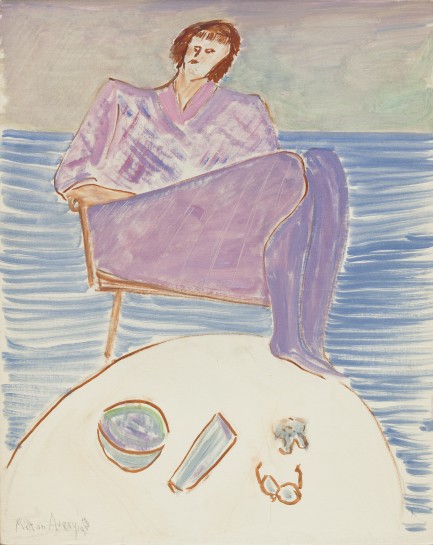
Elephant writes about Milton Avery: The Late Portraits
The American artist’s late paintings of intimate domestic scenes presciently reflect our current zeitgeist, at a time when detailed visual documentation of ordinary life has never been more prevalent and the question of normality is fiercely debated. By Thea Hawlin
A confession: I was introduced to Milton Avery’s work on Instagram. I saw him first on a scroll, my eyes caught on the fields of vivid colour, the swerve of a cream thigh, the triangular shadow of a crooked elbow. Not a traditional introduction to a master of fine arts admittedly, but an introduction nonetheless.
Born in New York in 1885, Avery’s world is Tetris-like; contours give way to clear borders. It is all colour and clear demarcations, the arch of a raised kneecap, a curved back: the forms of life split into shapes. Filled with simple compositions of domestic scenes, these paintings lend themselves to the square-blocked online visual world we curate and consume daily. Striking shapes and clashing colours catch the eye—his subjects stick in a scrolling world: swimmers relax on a Maine beach; a woman curls round a good book; people crowd about a table in convivial conversation. The work springs from life. Its allure? Honesty.
Image: Milton Avery, Lavender Girl, 1963
30 x 24 in
Courtesy The Milton and Sally Avery Arts Foundation and Victoria Miro, London/Venice
- Doug Aitken
- Njideka Akunyili Crosby
- Milton Avery
- Jules de Balincourt
- Ali Banisadr
- Hernan Bas
- María Berrío
- Saskia Colwell
- Verne Dawson
- Stan Douglas
- Elmgreen & Dragset
- Inka Essenhigh
- Ian Hamilton Finlay
- David Harrison
- NS Harsha
- Alex Hartley
- Secundino Hernández
- Ilse D’Hollander
- Christian Holstad
- Kudzanai-Violet Hwami
- Chantal Joffe
- Isaac Julien
- Idris Khan
- Yayoi Kusama
- John Kørner
- Doron Langberg
- Wangechi Mutu
- Alice Neel
- Maria Nepomuceno
- Chris Ofili
- Jorge Pardo
- Celia Paul
- Grayson Perry
- Paula Rego
- Tal R
- Conrad Shawcross
- Hedda Sterne
- Do Ho Suh
- Sarah Sze
- Adriana Varejão
- Stephen Willats
- Flora Yukhnovich
- Doug Aitken
- Njideka Akunyili Crosby
- Milton Avery
- Jules de Balincourt
- Ali Banisadr
- Hernan Bas
- María Berrío
- Saskia Colwell
- Verne Dawson
- Stan Douglas
- Elmgreen & Dragset
- Inka Essenhigh
- Ian Hamilton Finlay
- David Harrison
- NS Harsha
- Alex Hartley
- Secundino Hernández
- Ilse D’Hollander
- Christian Holstad
- Kudzanai-Violet Hwami
- Chantal Joffe
- Isaac Julien
- Idris Khan
- Yayoi Kusama
- John Kørner
- Doron Langberg
- Wangechi Mutu
- Alice Neel
- Maria Nepomuceno
- Chris Ofili
- Jorge Pardo
- Celia Paul
- Grayson Perry
- Paula Rego
- Tal R
- Conrad Shawcross
- Hedda Sterne
- Do Ho Suh
- Sarah Sze
- Adriana Varejão
- Stephen Willats
- Flora Yukhnovich
Victoria Miro Venice
San Marco 1994,
Calle Drio La Chiesa
30124 Venice, Italy
t: +39 041 523 3799
info@victoria-miro.com
View map
Opening Times
During exhibitions:
London: Tuesday–Saturday: 10am–6pm.
Venice: Tuesday–Saturday: 10am–1pm & 2–6pm.
We are also closed on Sundays, Mondays and public holidays.
Admission free.
Enquiries
All general enquiries should be sent to
info@victoria-miro.com
Victoria Miro does not accept unsolicited artist applications.
Before contacting or subscribing please read our Privacy Policy
We respect the choices you make about how you would like to hear from us. You will find links at the bottom of all emails we send from our mailing list which allow you to Update your preferences to change the way we contact you, or Unsubscribe if you want to opt out.
Read our Modern Slavery Statement here.
Read our sustainability statement here.
Subscribe
Staff contact details
Directors
Sales
Exhibitions
Communications
Operations
Technical Services
Finance
This website uses cookies
This site uses cookies to help make it more useful to you. Please contact us to find out more about our Cookie Policy.